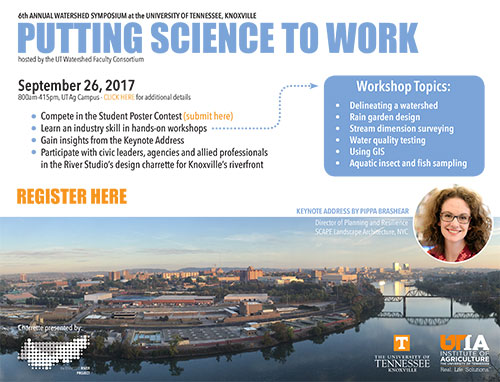 The 6th Annual Watershed Symposium at UT was hosted by the Watershed Faculty Consortium to provide university students an opportunity to learn a new skill with hands-on application, engage with industry and agency professionals in watershed-related fields, and participate in a problem-based Community Charrette to envision the future of the Tennessee River and its watershed. The agenda was filled with opportunities for students to engage in experiential learning with faculty from three different colleges five different academic departments.
The 6th Annual Watershed Symposium at UT was hosted by the Watershed Faculty Consortium to provide university students an opportunity to learn a new skill with hands-on application, engage with industry and agency professionals in watershed-related fields, and participate in a problem-based Community Charrette to envision the future of the Tennessee River and its watershed. The agenda was filled with opportunities for students to engage in experiential learning with faculty from three different colleges five different academic departments.
Over 150 students and faculty from 14 different academic units as well as university staff and invited guests attended the symposium. Opening remarks were provided by the Associate Dean of the College of Agriculture Sciences and Natural Resources, Dr. John Stier, who stressed the significance of clean water availability for successful societies and economies both in the United States and internationally. Then, two tracks of mini-workshops were available on the following topics: water quality testing for steams (instructor Dr. Joanne Logan and her Assistant Natalie Landry, Knox County Stormwater), watershed delineation (Instructor Dr. Joanne Logan and her Assistant Forest Burks, AmeriCorps), data representation using GIS (Instructor Liem Tran), rain garden design and construction (Instructors Drs. Jon Hathaway and Andrea Ludwig), stream dimensioning and flow measurements (Instructor Dr. John Schwartz), and stream biological sampling (Instructor Dr. Brian Alford). The purpose of these mini-workshops was to deliver instruction on a diversity of specific skills used in watershed careers. A networking lunch followed in the Ellington courtyard.
Professor Brad Collett opened the afternoon session, which incorporated themes discovered through the development and experiences of his River Studio course as his students envisioned the future of the Tennessee River Watershed. Pippa Brashear, Director of Planning and Resilience for SCAPE Landscape Architecture in New York City, provided the keynote address, sharing a range of projects that she has lead for the firm, all of which melded engineering, design, societal awareness, and ecology. A crosscutting theme was the complexity of design in the context of changing climate conditions, landscape dynamics, and societal needs. This set the tone for the charrette that followed. By definition, a charrette is a meeting in which all stakeholders in a project attempt to resolve conflicts and map solutions. Students of the Landscape Architecture River Studio facilitated four interactive dialogues on the topics of Ecology and the Environment, Access and Open Space, Infrastructure and Mobility, and Economy and [re]Development. Students worked along side invited community partners to tackle these pressing issues through the unique lens of the Tennessee River corridor through Knoxville, generating a wealth of ideas and excitement for future possibilities.
Thirteen student posters were displayed as part of the annual student poster competition. The judges were faculty members Drs. Richard Strange and John Schwartz and Professor Tracy Moir-Mcclean as well as local government representative Natalie Landry. The “People’s Choice” award went to the poster with the most votes from symposium attendees, and was awarded to Peyton Smith for her poster “Engineering Design Guidance on Highway Construction Sediment Basins,” under the advisement of Dr. John Schwartz. Second place went to Kyler Hecke for his poster “Historical Occupancy Modeling of Non-Game Fishes in the Clinch River Watershed,” under the advisement of Dr. Brian Alford. Third place went to Ryan Watson for his poster “Rain Gardens for Tennessee,” under the advisement of Dr. Andrea Ludwig. And the first place winner was Micha Wyssmann for his poster “Modeling the Stream Restoration Impacts of Boulders: Applying the Bedload Velocity Concept,” under the advisement of Dr. Thanos Papanicolaou. Throughout the day, refreshments and administrative support was provided by the Institute for a Secure and Sustainable Environment and facilitated by Tim Gangaware.
The overarching goal of the Watershed Symposium at UT is to showcase the collaborative efforts of faculty, staff, and students in the fields of watershed science and policy for the betterment of students’ training in their selected field of study. Each year, the execution of the symposium changes, but the end goal remains consistent. The Watershed Faculty Consortium hosts an undergraduate and graduate intercollegiate Watershed Minor program and is committed to showing students that all societal, economic, and environmental challenges would be best viewed in the context of watersheds.
